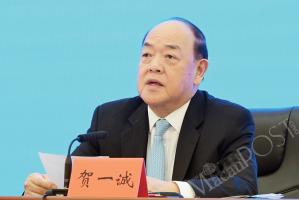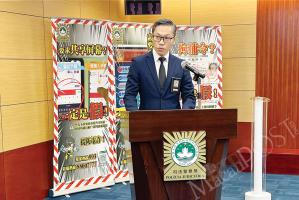2021-04-14 04:17 Comment:0
Chief Executive Ho Iat Seng said yesterday that the Macau government is studying the possibility of allowing foreign nationals without a local ID card who have been hired as domestic helpers to enter Macau as long as they have received two COVID-19 jabs at least 14 days before their intended entry into Macau.
In addition, they will have to test negative for the novel coronavirus in four consecutive nucleic acid tests (NATs), according to Ho.
However, according to Ho, the foreign domestic helpers allowed to enter Macau would have to undergo 21 days of hotel quarantine plus seven days of “self-health management” upon their arrival here.
Foreign nationals without a Macau ID card have, in general, been barred from entering Macau since March last year due to the COVID-19 pandemic.
Mainland, Hong Kong and Taiwan residents who have been to a foreign country within the 21 days prior to their intended entry into Macau are also barred from entering the city. Macau residents, including foreign nationals holding a Macau ID card, are allowed to return to Macau from a foreign country, but have to undergo 21 days of quarantine and medical observation at one of the government’s “quarantine hotels” upon their arrival here. After completing the 21-day quarantine, they are then required to practise seven days of “self-health management”.
Ho made the remarks when answering directly-elected lawmaker Agnes Lam Iok Fong’s question about the matter during a Q&A session in the legislature’s hemicycle.
Many foreign nationals who worked in Macau as non-resident workers (NRWs) have been laid off during the COVID-19 epidemic, including domestic helpers, and are stranded in Macau because of the scarcity of flights to their home countries.
Those stranded in Macau but no longer holding a valid blue card have been issued a temporary stay permit by the authorities.
According to the amended law on the employment of non-resident workers, which came into effect in October last year, only non-locals who have entered Macau with an entry permit issued by the Macau Public Security Police (PSP) due to the fact that they have been hired as a non-resident worker will be issued a blue card (i.e. a permit for them to work in Macau), which means that those who have lost their job here cannot be directly hired in Macau and must first return to their home country for a period of time. However, due to the Macau government’s entry ban on foreign nationals without a Macau ID card, non-resident workers who lost their job in the wake of the COVID-19 pandemic are unable to return to Macau, and neither can they be directly hired locally.
During yesterday’s Q&A session, Lam asked Ho whether the government would consider issuing temporary work permits to foreign domestic helpers who are stranded in Macau after having lost their job so that they can work for a new employer.
Ho said that currently some 3,000 laid-off foreign non-resident workers are stranded in Macau, including about 1,100 laid-off domestic helpers. Ho insisted that many of them have expressed their willingness to return to their respective home countries on specially-arranged flights, but some of them, Ho said, had chosen to stay in Macau as they were “expecting” the Macau government to suspend implementing the new rules of the amended law on the employment of non-resident workers so that they could directly get a new job in Macau – without having to return to their home country first.
Ho noted that the amendments to the law on the employment of non-resident workers, which only took effect last year, aim to tackle the previous adverse situation in which some domestic helpers caused their employers to fire them due to a deliberately poor work performance so that they could then directly get a new job here with a new employer. Ho underlined that if the government chose to axe the new rules in the law by proposing new amendments to the law merely with the aim of enabling the 1,100 stranded laid-off domestic helpers, it would cause a significantly adverse impact on the about 27,000 families in Macau who are employing domestic helpers.
According to data from the Labour Affairs Bureau (DSAL), Macau’s number of non-resident workers hired as domestic helpers stood at 28,938 at the end of February, including 16,120 Filipinos, 6,195 Vietnamese, 4,123 Indonesians and 1,555 Myanmarese, as well as 658 mainlanders.
Lam also asked Ho whether the government would consider allowing foreign domestic helpers to enter Macau with the aim of solving the predicament faced by some families in Macau who are in need of a domestic helper but cannot get one in the wake of the COVID-19 pandemic.
Families unable to hire maids are ‘suffering’
Ho said in his reply he understood that the families who are in need of a domestic helper but unable to hire one are “suffering”, because of which the government has been studying solutions to their situation. Ho said that the government would possibly announce a new measure in the near future, according to which foreign nationals who have been hired as domestic helpers will be able to enter Macau, provided that they have received two COVID-19 jabs in their home country at least 14 days prior to their intended entry into Macau, adding that in addition they will have to undergo four nucleic acid tests (NATs) all of which must show a negative result for COVID-19.
Ho said that under the new measure, the foreign domestic helpers must undergo 21 days of hotel quarantine plus seven days of “self-health management” upon their arrival in Macau.
The chief executive also underlined that the countries where Macau’s foreign domestic helpers normally come from are COVID-19 high-risk areas, because of which the Macau government needs to implement strict COVID-19 measures for them. Ho underlined that potentially foreign domestic helpers pose a high COVID-19 risk to Macau as they work in the community where many of them look after the small children of local families.
Ho said that the Health Bureau (SSM) would implement the new proposed measure allowing the entry of foreign domestic helpers as a “pilot” scheme first if there is no controversy in Macau’s civil society about the new “framework” on how the new measure is implemented. Ho said that in case Macau would be hit by “many new imported COVID-19 cases every day, like in Hong Kong” in the wake of the possible implementation of the new measure, it would be a “warning signal” to Macau as to whether the new measure could continue.
Foreign spouses of Macau residents
Meanwhile, Lam also urged the Macau government to allow the foreign spouses of Macau residents to enter Macau for a family reunion, in reference to such a measure in the mainland, insisting that the foreign spouses were willing to fully comply with the Macau government’s COVID-19 prevention and quarantine measures to be allowed to enter Macau.
Ho noted that the Macau government does not bar local people from leaving Macau so that local residents could choose to meet their family member in a foreign country by taking transit flights in a number of places such as Taiwan and South Korea.
Ho underlined that all Macau residents are allowed to return to Macau from anywhere in the world as long as they comply with the government’s COVID-19 quarantine measures.
Ho asked rhetorically whether residents in Macau would accept the government’s measure to relax its entry ban on foreign nationals without a Macau ID card by allowing the spouses of Macau residents to enter the city.
Ho underlined that if Macau was to be hit by COVID-19 after allowing all foreign nationals to enter Macau again, the city’s medical facilities would not be able to cope with the situation.
Since December last year, Macau has allowed certain foreign nationals without a Macau ID card, such as non-resident workers, the spouses or offspring of a Macau resident, or those who have been admitted to local higher education institutions, to enter the city, as long as they have been in the mainland for at least 21 days prior to their arrival here.

Chief Executive Ho Iat Seng answers questions from lawmakers during yesterday’s Q&A session in the Legislative Assembly’s (AL) hemicycle. Photo: GCS

Directly-elected lawmaker-cum-media scholar Agnes Lam Iok Fong speaks during yesterday’s plenary session in the legislature’s hemicycle. Courtesy: TDM
 Macau to host 4 competitive, 1 mass sports events for 15th National Games
Macau to host 4 competitive, 1 mass sports events for 15th National Games
 Macau, HK, Guangdong finetuning deal on joint emergency response in GBA: Macau fire chief
Macau, HK, Guangdong finetuning deal on joint emergency response in GBA: Macau fire chief
 Local victim of ‘fake police scam’ rescued by Macau cops in Mexico: PJ chief
Local victim of ‘fake police scam’ rescued by Macau cops in Mexico: PJ chief